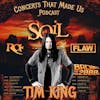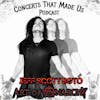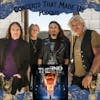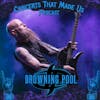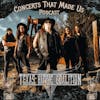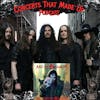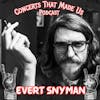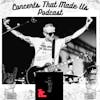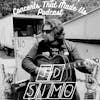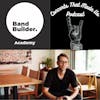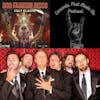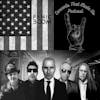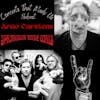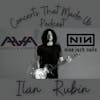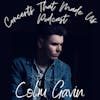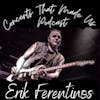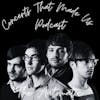Taking Folk Metal to Eurovision: An Interview with Cruachan's Keith Fay
In this captivating podcast episode, Brian has the privilege of interviewing the esteemed Keith Fay from the legendary Irish folk metal band Cruachan. Renowned as the co-founders of the folk metal genre, Cruachan's impact on the music scene cannot be overstated.
During the interview, Keith delves into the band's bid for Eurovision, representing Ireland on one of the grandest stages in the world. He shares the excitement and anticipation they feel at the possibility of showcasing their unique blend of folk metal to a global audience. Keith also sheds light on the creative process behind their latest album, detailing what went into creating one of the best albums of their career.
As the conversation progresses, Keith candidly discusses the band's journey during the challenging times of the COVID-19 pandemic. He reflects on the obstacles they faced in creating new music amidst the restrictions, highlighting the resilience and determination that kept him going. Keith also opens up about having to recruit an entirely new line-up and bringing them up to speed within this timeframe.
One of the highlights of the interview is Keith's vivid description of the unique atmosphere at Cruachan's live shows. He passionately describes the electric energy and profound connection they share with their audience, emphasizing the band's ability to create an immersive and unforgettable experience for all who attend. Furthermore, Keith delves into the delicate balance between their personal lives and the demands of being in a band, shedding light on the sacrifices, dedication, and unwavering passion required to thrive in the competitive music industry.
As the episode draws to a close, Keith generously shares his diverse musical interests and influences, showcasing Cruachan's versatility and open-mindedness when it comes to creating music. This interview serves as a captivating and insightful exploration into the world of Cruachan, providing a deeper understanding of their profound contributions to the folk metal genre and their enduring legacy in the music industry as a whole.
Find Cruachan here:
http://www.cruachanireland.com/
https://www.facebook.com/cruachanclan
https://www.instagram.com/cruachan_official/
https://www.youtube.com/cruachankeith
Find CTMU here:
https://linktr.ee/Concertsthatmadeus
Newsletter: https://concertsthatmadeus.aweb.page/p/f065707b-2e34-4268-8e73-94f12bd2e938
Save 10% on Band Builder Academy membership by following this link https://bandbuilderacademy.com/Brian_Concerts/join and using promo code "concerts" at signup.
Become a member at https://plus.acast.com/s/concerts-that-made-us.
Hosted on Acast. See acast.com/privacy for more information.
Brian (00:00:00) - Keith you're very welcome to Concerts That Made Us.
Keith (00:00:03) - Cheers, Brian. Pleasure to be here.
Brian (00:00:05) - It's fantastic. I feel honored. I'm having an Irish metal royalty here on the podcast, So we have a couple of things to talk about now, I suppose. First of all, you're a vision. What's to say here about you guys are after applying to do it again this year.
Keith (00:00:23) - Yeah. So Eurovision is an interesting one, especially considering we tried last year and we, we we didn't make it, but it was just. With our submission last year, the fact that we got to the last ten and then six of those go to the final, I thought, you know, skin of our teeth will we won't we? So we decided we will we'll, we'll take some lessons learned. Did a new song and we've submitted it. But our whole Eurovision journey started way back in 2014. We were on tour in Ukraine, and I think it was from what I remember was the head of Google in Ukraine.
Keith (00:01:02) - I know the guy like he's my Facebook friend, I just can't remember his name. And he came up with the idea. Would you guys be interested in representing Ukraine? If you're working with one of our national singers, you'd be kind of the band crew. Akon with I can't remember her name now. Oh God, get really getting old. But, um, the plan was we'd write a song together, she'd be the lead vocal, and it'd be a collaboration type of thing. In the end, that was when Russia started their shenanigans and invaded Crimea, and pretty much they Ukraine decided to call the whole thing off. So, um, they didn't enter Eurovision that year. That was the end of it, but kind of left the seed in the, you know, like made me think about, well, why represent another country? Why not represent Ireland. So so that's where it came from. And I have some friends that work in art and not very high up. But you know, they're watching the Eurovision over the last couple of years and saying, guys, would you not give it a try? You know, I think we need something different.
Keith (00:02:03) - But ultimately they're not the decision makers. It's there's a big there's like 300 industry professionals were told that pick and apparently four songs and then two are picked by the heads of RTD and they go forward. So we'll see what happens. We're we're happy with the song and we just have to wait and see. And it could be any day. It's we're just into November now. We should hear something in the next couple of weeks, so fingers crossed.
Brian (00:02:28) - Brilliant, brilliant. I have to say though, when I first heard of it last year, I kind of thought to myself, you guys are a bit too cool for your vision. I feel like your vision these days is kind of it's not taken too seriously, you know?
Keith (00:02:42) - You could say mean I know where you're coming from, but like what? What does that even mean? Like, if you get onto Eurovision, you're in front of an audience of hundreds of millions, like, essentially, um, and look at the winner from not last year or the year before.
Keith (00:02:57) - My skin, not my cup of tea, but pretty good rock band from Italy and nothing cringey about them at all. I'm not a fan of their music. That was only two years ago, what I would call a really decent, good band. One thing now I know you're thinking it's just the campy side of it, and there's no doubt Eurovision is just way out there. But, um, I don't know. I think it'd be good fun. I think we got to play some metal and, you know, we even with this new song, although we, we changed it a little bit to kind of molded into what we think people might be interested in hearing, we actually made it a more of a more, a more true Croatian song than The Blacksmith. And like, there's aggressive screamy vocals in there, stuff that on the last song you think, oh, we better not do Screamy vocals because it'll turn a lot of people off. And so yeah, we just went full tilt with it this time, so we'll see.
Keith (00:03:50) - Now it's not crazy. Black metal like crew can run the full gamut of extremity, from black metal to just like straight up heavy metal. We're down on that other side for for that, for the Eurovision stuff. But there's a bit of aggression there in the vocals. So be cool of a Guardian like, you know, even in even if we got to the televised final in Ireland, even just one of those last six, it'd be a bit of vindication that the show, like people are listening and people do want a bit of a change, but ultimately that then goes to the televised vote and it's totally out of our hands. So we'll see what happens.
Brian (00:04:22) - Yeah. Fingers crossed. Anyway, it'd be great to kind of get Ireland back to the days where we used to kind of win almost every year, you know?
Keith (00:04:29) - You know, you remember that three years in a row and they were great songs like you had um, there was Charlie McGettigan and the other guy, Rock and Roll Kids, there was a simple ballad song, Two Guys with acoustics.
Keith (00:04:41) - And then you had Emer Quinn with the voice, and that was just a beautiful Celtic song. It was so Irish. And if we could go back to that now, we've gone back to that. But we're heavy metal, that's what. That's our bread and butter, you know. That's what we do. So yeah, hopefully, hopefully something happens.
Brian (00:04:59) - Fingers crossed. We'll we'll be all praying for you anyway. Yeah. You can see you might actually watch it this year if you guys are in. No.
Keith (00:05:06) - Yeah.
Brian (00:05:09) - And you know you guys released The Living and Dead this year. And it kind of seems like so long in the industry, you're finally getting the recognition you deserve. What is it about this album you think speaks to so many people?
Keith (00:05:22) - Well, I think with this album's definitely been the best reviewed, but I know the last ten years we've seen a lot more recognition across the world. We've always had a fan base, we've done well in Ireland from the early days we struggled and it was in the metal scene when we were just, you know, insular and within the metal metal scene.
Keith (00:05:42) - People thought it was ridiculous. What we were doing was like, the lads and Tyler are off their heads, like, what's this folk music mixed with metal? This is the very early 90s, the most way out there thing at that time, which was a big influence for me, was Nocturnals when they introduced keyboards and and they built themselves dead metal with keyboards. And it was a huge thing a lot of people hate. It is like you can't have keyboard and death metal. It's just goes against everything that that metal is. And then like a year or two later, crew can't come along with every instrument you can think of. And we, you know, we were pretty serious about what we were doing. We did get recognition because we got a big record deal quickly, and we had Century Media trying to sign us within two years. But in Ireland it was just like, wow, this is terrible what you guys are doing. And I always say in interviews that's across Europe, there were all these folk music revivals where it became really cool to like to get into folk music and find that kind of paganism, the cultural kind of stuff.
Keith (00:06:41) - We never had that in Ireland because folk music never died out. It's it's omnipresent. It's always been here. So as kids, we grow up listening to our dads, listening to folk music so immediately, oh, that's my dad listens to you hear it on advertisements all through the 80s, in the 70s, selling out from biscuits or cigarettes to diddle diddle doo doo. And it's always there. So that's why I think a lot of the 90s kids into metal were just like, oh, why would you want folk music? That kind of stopped? We've got a lot of respect now in Ireland and beyond. And and we've seen that with the, the kind of the Trilogy of Blood. When it started with nine Years of Blood, things really, really began happening for us. That's when we started playing the hell fests and the 70,000 tons of metal, all of those big festivals. This year with the new album. It's kind of frustrating because we're just out of Covid. We we struggled to find festivals this year when we should be out on the festival circuit from promoting this album.
Keith (00:07:39) - Now, next year is looking great. We've already got five festivals confirmed. There will be more to come, but it's just a Covid hangover. I'm reaching out to festivals who are either this year or last year, to finally putting on the full show that has been canceled for 2 or 3 years running, and they've had lineups copied over, over and over. So the timing was terrible to actually release what may be the best album of your career, but what can you do? You just need to roll with it.
Brian (00:08:05) - Exactly, exactly. That's it, that's it. And can you give us a glimpse behind the curtain? You know, I'm sure many listeners now that are familiar with you would love to see what way you guys work. So when it comes to making new music, how does the process work?
Keith (00:08:19) - So it's usually me like, we've we've had a lot of band members turnover and it's not being true drama or anything. It's just a length of time. We're going, you know, John Classi, the bass or bass player he left.
Keith (00:08:35) - 12 years ago. Probably more. Am I putting too many years on them? Yeah, I'm really aging him, but he left about 12 years ago and he always said, when I hit 40, I'm done. I'm leaving it. I'm leaving the band. And he did. It's like, wow, you really, really had that goal in mind and fair play to you. So we have him back in the band a lot of times and. You know what's been torn over recently with albums. So ultimately, I'm the only original member to creating members, the driving force, all that kind of stuff. But I've always been the main songwriter, and that's one thing that's kept us going as well. I've never depended on other people, and I can, I can like did. A whole new album was pretty much 100% written by me previous albums. And there were there was definitely collaboration with the other members. And, you know, that's even saying that it's not accurate because I'll come up with music, we'll rehearse it with the new lineup in the studio, and there'll be a lot of like, that's not working.
Keith (00:09:32) - What have you tried this? And you know, that's great. Maybe push that out another four bars instead of ending it where, you know, I was always a drummer. Never gets credit because essentially they are writing their entire drum parts now, even that. I'll have some ideas. Well, this is a blast beat or this is a slow part, but ultimately drummers don't seem to get the credit. They really do because I always say they are right in their own parts. For nearly every song. But the process is, yeah, I just usually come up with a few riffs and 50 years some melodies, get some ideas, record them on my phone, and then I go through a kind of creative sport where I'll start recording and trying to flesh out full songs. And I mean, that's interesting. Interestingly, there's a track on the new album that has a kind of a thrash metal riff right in the middle of the song The Crow, which was a really cool video single that we released as a cool thrash metal part, right in the middle like that.
Keith (00:10:24) - That riff was written like 31 years ago, and it was always, I have to get that. 21 years ago, we were not into the black metal stuff and I thought, oh, that's it's not going to work on the black metal stuff. I try get that in somewhere else. Then we kind of we fell off the radar around 97, 98 on Wikipedia says we broke up. We didn't really break up. We just weren't doing anything. And then, you know, that riff just slips out of your mind for 15 years. Then it comes, oh, remember that cool riff I had? And and lo and behold, there you go. That's that's like there is a riff on that album that's 21 or 22 years old, which is insane. And but that's pretty much it. So we'll come up with the the bits get a kind of rough cut across to the guys, and then we get into the studio work through Michael, Joe or bass player. Joe is a very good friend of mine, an old friend.
Keith (00:11:12) - He was one of the original drummers way back, and he left and came back playing bass. So we would trash out a few bits, get some ideas. But ultimately in the studio when we're rehearsing, we decide if it's working or not, and even when we're recording, there's a lot of collaboration and ideas and and just, just just experimentation that happens when we're back when we're in the studio recording. So it's hard to say if there's a defined process, but that's that's kind of it, I think. Right ish.
Brian (00:11:42) - Getcha. One thing that stuck out, it was, you know, you're the driving force. You're the constant member. How has that affected your ego? You know, are you kind of like, this is my band. You do it my way.
Keith (00:11:54) - There's there can be a little bit of that and that can frustrate people. And like, I have a vision, I have a set of goals and I've standards of things that I expect. I've spent 31. I think it's 33 years now working on this, and in a lot of ways I'm lucky because I am the main person.
Keith (00:12:13) - If it was a band that depended on for people, they would. It's very hard to make that last over that length time. And so I'm lucky in that way. When the new guys came in, I literally said to all of and said, look, I'll be writing pretty much every note of this new album. And there's a couple of reasons for that. When you're established in the band, and I know you're not going to leave within six months, having written half the album, and you'll definitely have a little bit more influence, a little bit more say, and a little bit more creativity. But at the moment you're all fresh and new, and I don't want too much input from people that are only newly in the band and may not be interested in staying in the band. So that was two three years ago. So they're now on like Audrey, Tom and Joe and me are the band we we we gel, we get on so well and so create creativity wise, there will be a lot more involvement from them because we are in a full on unit, but yet there can't be that little bit of, um, it's not an ego.
Keith (00:13:16) - It's I think as I explained there, it's just you don't want to upset the balance. You don't want to upset what you've worked so hard to achieve. And I can see why people would say like, oh, you know, it's an ego thing, like, oh, it's my way or to the highway. But there's a lot more to it than that. As I hopefully explained to them.
Brian (00:13:35) - No, you did. You did make sense. Makes sense. And at this stage. So I'd love to dive into your history when it comes to music, to give the listeners some insights where you come from. So it's a bit of a tricky one though, but can you remember your earliest musical memory?
Keith (00:13:50) - Yeah. Pretty much. Um. I mean, well, there's been music through my all through my life. Remember some of the songs my dad listened to? I even remember my dad listened to the Pogues in the 80s, so I would have been before I got into metal and they were just coming out on the scene, and God, I hated them.
Keith (00:14:08) - I was like, God, this my dad in from the pub on a Sunday afternoon and oh o hated Shane MacGowan. It's so interesting to see how that went. Like he's a hero of mine now and I got to work with him. But like from the metal side of things, it was definitely I was always, you know, the younger brother looking at what my bigger brother John was doing. So when he was into madness and and the Scar musical, I was like, yeah, I love madness. You know, I'm probably eight years old, I love madness, and no, today I do love madness, I love ska, I've loved it for years. So when John started hanging around with the heavy metal crowd, started listening to Metallica and Slayer. Same here. That's what I started listening to. And we've got some cringey memories. Like you're talking a year before I joined my first band as a metal vocalist when I was 13. There's memories of me being 11 and 12 years of age, just like following my brother and his heavy metal mates around there, probably 5 or 6 years older than me, just like to be near them.
Keith (00:15:06) - And they always John, I always said like I would just randomly like an idiot, just know Slayer like as if that's going to make them accept me. The fact I've shouted at a metal band, oh my God, there's some of my earlier memories that are not really great. They're.
Brian (00:15:24) - Oh, believe me, I've heard worse. Now I've heard worse. And can you pinpoint the exact moment then that sparked a desire to become a musician?
Keith (00:15:33) - Um.
Keith (00:15:34) - Yes, I definitely can. I can, I had my dad's old guitar and. I was. I know I was really into metal and I was 12 years of age. Feudal lords are a little bit older than me. Just hitting about 13. We decided we'd form our own band, had no clue what we were doing. I was the vocalist and I just started screaming. I was really into napalm that. So listen to, um, Mick Harris with his screamy vocals and Milli from Kreator way back in the early 90s. I thought that's and this is before the black metal explosion, so I wasn't really exposed to the dark drones or any of this.
Keith (00:16:13) - This was before that, where that extreme black metal vocal became so popular. The likes of napalm, that Carcass and Kreator were doing it already. So I started screaming as that, that young kid, 12 year old into the into like we we'd record, we'd rehearse with like a few amps, drums and with no PA or anything like that. So we'd record on a stereo and I just kind of hold a stereo here. I'd be screaming all what? No one can hear me. Then when we play back through here so you can hear my vocals on the on the rehearsal tape, on the cassette tape. And and it was terrible. But my sister, who's a few years older than me, was going out with a guy, Martin Carl, and he was in a band called crypt, and they were excellent. Like, if you recommend checking out some of the demos, they're very, very badly recorded. I think it's 1992 is when we did our first demo. And what you hear, the technical death metal that was being done there, like thing should have happened with that band.
Keith (00:17:08) - They didn't. But yeah, Martin was going out, my sister and he heard some of the rehearsals and he needed a vocalist. So these were like 17 and 18 years old. I'm like 12, just this little kid. But they were like, wow, about about the vocals. So that was the first time I joined a real band. Was was true that kind of that's the early premise of how I got into music. But actually what I was saying was when I was rehearsing with crypt and the band before that, we were called Puss Puss. Pure, utter shite.
Keith (00:17:37) - That's that.
Keith (00:17:38) - That's what we were going for. I used to always come back after the rehearsals, watching the guys on guitars and I'd have my dad's acoustic guitar flat on my my lap, and I'd just be using my thumb up and down trying to do like, scone by napalm, then boom, boom, boom, boom, boom. I remember like my sister and my mum coming in like, oh, isn't he lovely? Like trying to learn the guitar, but.
Keith (00:18:01) - There we are. That's where the roots are.
Brian (00:18:05) - Right? And your local music scene growing up, then what was it like? And how do you think it compares to today?
Keith (00:18:11) - Oh, I mean it's very similar. Way back then I remember well, first of all, when I was with Krypton in the earlier. So it was it was cool and it was great. There was a lot of support. And I told you what happened with crook, and there was a lot of like, what are these guys doing? It's too out there. And but we still got a lot of interest. People came to the gigs and so on. But I always remember back then there was a lot of begrudgingly and that's still there in the Irish scene. People want you to do okay, but not to okay, you know, and so what people like the last ten years, like you just look at our Spotify Monthly listeners were probably one of the most listened to metal bands in the country outside, probably ten Lizzy or somebody like that gamma bomb from the North.
Keith (00:18:54) - Wow, David. Amazing fan base as well. But it's interesting to see that we do have that support now, because way back then, no, it was totally different. It was that kind of thing. Everyone at the in the crowd back then were probably in a band and they're just looking at, you know, he's okay, but, you know, hope he makes a cock up here and that kind of thing. And I think it's a bit better now. I think there's a there's a lot more support for Irish bands. Back then it was a little bit there was a bit of a cringe factor like, oh, these are Irish, you know. They're not. This isn't a real deal. Now you look at the likes of primordial us playing all these festivals that support and fan base we have. It's okay for Irish fans now to kind of go, yeah, these are great. You know, we do love them, but we play Dublin, we try to play Dublin at least once a year.
Keith (00:19:44) - And you know, it's funny to say, but at least half the crowd is Irish because there's so many different nationalities in their country. But at least half, if not more, are Irish. They travel from around the country to get to the crew can't gig. They're wearing their shirts and they're respecting and really appreciate what they appreciate and what they hear. It just was not like that back then. Bands were not signed, I think was awesome. Primordial were the two first proper record deal and signings that bands had in the country, and that things got better after that. So now I think things are actually much better. There's a little bit of similarity, there's a little bit of begrudgingly still there. No way is it to the extent of what I remember like almost 20 years ago.
Keith (00:20:25) - Yeah, yeah.
Brian (00:20:26) - I'm often trying to explain that to my American guests. The whole Irish bigotry. It's like we want you to do well, but not too well. Kind of stay in your place, you know, and they just don't get it at all.
Brian (00:20:38) - You know, it's just something that's not in their culture as well. Not.
Keith (00:20:41) - And isn't that the same like for everything in Ireland? Like I've seen some like comedians and different sketch shows on TV under pointing out the very same thing. So it's not just unique to the metal scene, it's just unique to the Irish psyche, I think.
Keith (00:20:56) - Yeah.
Brian (00:20:56) - Yeah, exactly, exactly. It's weird. And it's called concerts that made us so as a concert goer, what concerts would you say have made you?
Keith (00:21:07) - Oh, yeah, that's a tough one. So I have to point out the first concert I was ever at, I can remember, and I was super young. It's a band that nobody has probably ever heard of, but they were a local heavy metal band. They played in McGonigle in Dublin, a legendary venue that's long gone. We used to go to a lot of them metal club nights there, right very close to, um, Brussels bar, where to fill in a statue. You're talking a minute walk from there you'd be in mechanicals.
Keith (00:21:37) - So there's a local heavy metal band called Chancer Icarus, and they were just doing the rounds. I can't remember if they did original stuff or covers, but I remember just hearing the heavy guitars. This is before I was in. It was probably when I was in the band Puss, about a giant crypt or just before crypt. I remember just being in awe, like seeing these guys on stage just go, wow, this is a real heavy metal band. And back then there was a little bit of an. Heavy metal wasn't as accepted as it is now. There was a bit of a real rebellious thing to to be into heavy metal and the classic your mum and say, oh, it's just a phase that he's going through. And so I had all that as the 12 year old. It could have been 11 at that concert kind of going, oh wow, this is real cool. And it's kind of, you know, my parents probably don't want me here listening to this. This is amazing.
Keith (00:22:28) - So that really had an effect on me. And of course, the first gig, metal or otherwise, that I've ever been at. But yeah, it's a shame it wasn't like Iron Maiden or something like that. And after that, what really stood out to me. I think Iron Maiden recently, I think in 2014, in Dublin and we're jumping way ahead now. I just thought it was a standout gig because it was before the new album, and a lot of people were saying their past or sell by date. They're, you know, they're a bit of. Some people are saying husbands, they're never going to be husbands. But I went to see that concert. Just a little bit of that going on in my head. Place was packed in the O2 arena. They put on one of the most amazing live shows I've ever seen. And they're, you know, they're pretty old, you know, they weren't in their 70s then. I'm not sure what age they are. And they were all in their early to mid 60s and they were just given it socks.
Keith (00:23:22) - And I just thought this is what live, this is what metal is about. You know, it just blew me away and not a really cool memory. And it's around the same time. And it was Twisted Sister in Belfast in 2016 I think. So hell Fest 2016. Cruel can't played there. And it's funny when you're playing a concert, when you're playing a festival like that, you're backstage hanging out with bands you're probably a fan of. You're on the same level. They're all your peers. So bands that you see like, oh, I'm going to see this band, this band, this band, but you're backstage chatting with them all. You end up missing all of the concert because you're just in the zone and having great conversation. But I made a point of getting able to see Twisted Sister, and it was just incredible, and I was never really a fan of them. I used to think they were super cringey. I always thought they were like Bon Jovi or Guns, not really, but Bon Jovi or Def Leppard.
Keith (00:24:19) - They did that type of music. You're talking maybe only ten, 15 years ago I realized, no, they're actually a full on heavy metal band. Just they look like this, you know, so kind of got into their stuff and that consider Hell Fest just blew me away again. They're older, they're on stage. I don't know what it is, but just seeing the older guys rocking out, I always say to myself, I want to be still doing this. You know, when I'm in my 60s and 70s, I want to be up on stage playing music. And I think that's why those the three shows I mentioned, they're the first one I've ever seen. Those two later ones, they really resonate. It's just I have such respect for these guys that just keep doing what they're doing and not not nothing will stop them, you know?
Keith (00:25:01) - Yeah, yeah.
Brian (00:25:02) - I think it needs to be said. It's if they're still good, if they're still capable, I think there's nothing worse than seeing a band that are in their 70s that just can't do it either, you know.
Keith (00:25:13) - Yeah.
Keith (00:25:13) - No, you're absolutely right. And I've heard some stories. Luckily, I've not witnessed Danny, but I think recently, like in the last 12 months, everyone's talking about guns and roses and saying like, Axl, just I know they've dropped the songs down a couple of keys to try help with his vocals. And yeah, a lot of people are saying about Axl Rose and Guns and Roses. So that's I did watch one of the concerts actually there a few months ago. I think it was. I can't remember what it was because everyone's saying, oh, you got to hear how bad this is.
Brian (00:25:42) - And bingo was was a Glastonbury or something. So in England it was, wasn't it?
Keith (00:25:45) - It was Glastonbury. Yeah. It wasn't great. So yeah, that's that's a prime example of what you're talking about right there.
Brian (00:25:51) - Yeah. Exactly, exactly. And the moment we're all waiting for your own gigs, for any listeners that haven't been lucky enough to catch one, give us the full experience.
Brian (00:26:00) - If you can. What is it like?
Keith (00:26:03) - Well, I.
Keith (00:26:04) - Mean, when we play Dublin we try to give a show and. We stick to festivals. Mostly. Over the last couple of years we haven't really toured. I find touring is awful. I just don't like it. I don't like being on the tour buses and the amount of drinking and just craziness, like I just can't hack that anymore. After two nights on the booze, I'm I'm done. I can't do it. The last kind of tour we did was a 5 or 6 day tour of Scandinavia about six years ago, and even then I just thought, I can't, I just can't do this. We stick to festivals as much as we can, so when we play festivals, we're kind of at the mercy of where we are on the set. Can't really put on the kind of show we can we do in Dublin or when it's our own headline show. So in Dublin, if you got if you can make it to a Dublin show, it's quite an experience.
Keith (00:26:53) - We always have our Viking Celtic re-enactment group, Joffrey Drinker, they appeared in the um, the The Reaper video and they look amazing. So if you're going to see us in, for example, the Grand Social before you arrive or if there is a queue, we used to play the but in the factory and to be a long queue of people getting in, but they would do full exhibitions and, you know, fights and battles outside and so, so cool. Like while you're queuing, you're seeing the same with the ground. So like we just played the Grand Social and one month ago, actually the 7th of October, last month we played there. It was a rainy day. They couldn't do as much as normal, but they were outside. All of the reenactments were taking place, and when we finally get on stage, we have them. They come, there's Celts, there's there's Vikings, there's battles. We're all in costume, and we bring up former members on stage a lot. So we had my brother John was there and he came up, played some whistles and flutes and some tracks.
Keith (00:27:52) - Then halfway through the the show, we bring up Kim Dilla. Kim is our live female vocalist because we had a huge period in history where we had Karen Gilligan as our lead vocalist. So a lot of songs are written with Karen in mind. So we played that era of Korea and we we need a female vocalist and there's female vocals on the new album as well. So, Kim, when we can make it happen, she's our live female vocalist and Kim is amazing. She used to, she was the vocalist for Gwar, she was Voltron for Gwar, and she does all the stage clothes for so many of the biggest metal bands, like she's unbelievable and it's just such a presence on stage. So when she comes on, just things get turned up to 11 as well. And so it's really cool. Now, having said that, I watch back videos and we, we are sometimes criticized for being too static on stage. And you know, we're not giving it loads. And, you know, sometimes in my head I think I'm, I'm giving it like I'm going to have a brain hemorrhage.
Keith (00:28:50) - I'm just going and say, and then I watch the video back and I'm probably like this, you know.
Keith (00:28:54) - Right.
Keith (00:28:55) - Well, what can I do? I can I can only do what I can do. Sometimes there's a habit that I have where I'm constantly staring at my hand, you know, on the guitar. And I don't need to, you know, it should be more interaction with the crowd. So that's something I personally have been trying to work on. But it's hard when you're on stage. You're just in a zone. And yeah, that's pretty much the Kroq on live show.
Brian (00:29:20) - You have to be the one band we're going to see live, especially in Dublin. Feels like, you know, you're on the set of Braveheart or that TV show Vikings. It looks unreal.
Keith (00:29:29) - And it's great. Like in recent years, a lot of the crowd are coming in with the blue face paint, and we're seeing guys coming in and kilts and battle. So like the gig last month. So we had a ton, we had the re-enactment group, but there were so many guys in their own Celtic and Viking costumes, we literally couldn't tell who was who.
Keith (00:29:47) - Like, who's here to see the gig and who's here to actually do the performance, which offered Ranger. But that was awesome. Like, you know, I'm on stage. I think there's about 250 people there, which in the grand social that that's, you know, that that's like, you know, that's a good crowd for the grand social. I remember looking out and just every second face had the blue face paint on. It was amazing to see it.
Brian (00:30:08) - Yeah, yeah. And if you think of all the gigs you've played over your career in, it is the one that sticks out as the most perfect experience you've had.
Keith (00:30:17) - Um.
Keith (00:30:19) - There's there's been there's been so many great gigs, um, like, we played that festival in Ukraine that stands out purely. The performance was fantastic, but there was, I think 5 or 6000 youths there. It was. It was a festival for teenagers in Ukraine, and it was just after the Crimean invasion and things were a little bit weird and we just gave it socks.
Keith (00:30:44) - We had our piper, Alex, who plays with us, he would play with us when we play Russia, Eastern Europe, Ukraine and stuff. But like, I don't think we'll, I don't know, we'll ever play Russia again the way things are. And but he was playing like the Ukrainian national anthem and all of these thousands of, of kids, I say kids, they're all teenagers. You had to be over 16, I think, to be at the show. They're all singing along, and I think there's a video out there where it happens. You could just see us coming out, this is amazing. Like, this is this is unbelievable. And the show's on 70,000 tons of metal art. Just next level. Like that whole festival, the cruise ship coming out of Florida, the bands that are on there and the crowd. It's it's unfair to pick that because you could literally get up on stage and just bang a triangle for half an hour and the crowd will go insane for because it's just everyone's in party mode, but they really stick out.
Keith (00:31:36) - The seven 70,000 tons of metal is an experience. If anyone can can get there. I can't recommend a highly enough. We're lucky to have done it twice. Hopefully we'll get to do a the tour time. But yeah, it's incredible.
Keith (00:31:48) - Incredible experience. Wow.
Brian (00:31:50) - And you know, I always say you have to have the good with the bad. So is there a gig that maybe everything went wrong and how did you overcome it?
Keith (00:31:59) - And we've never had that level of just disaster. Thankfully, we've had moments like I remember on stage in Chile, we did a tour of South America a few years ago, and in Chile and Santiago was it was about, as I say, a smaller venue, but in Dublin, the Grand Socialist, the Grand Social. In Santiago it was the size of the grand social. But you expect when you're on tour, you're playing these huge halls and so on. So it's a smaller venue. The stage wasn't too big and I was right up front with the crowd, but there was a bit of a barrier fence type of thing.
Keith (00:32:33) - Everyone's going wild. We're getting into it and remember, just stick up my guitar. You know, that kind of pint the guitar and everyone grabs it and the strings are gone. Bang, bang on. Like, oh man. Like rookie mistake. Like why? Why did it? But then you think like, why would you do that? You're here to see your band. I'll just grab the guitar. And knowing at least, at the least put it out of tune. At the worst, break the strings. But and we've had some funny moments way back when we started, we played the Heineken Green Energy Festival down in Galway, and it was we're playing there, I think, with a noona and Sharon, Shannon and a few others. This was back when we had a manager, which led to the Shane MacGowan kind of collaboration, but it was before the Middle Kingdom album. So this is before 1999, I think. God, the memories getting a bit fuzzy, but the way they did it, you play a couple of different stages, so we played open air in Air Square, which is great.
Keith (00:33:30) - You know, a few people were there and rocking out, but some of the heavier stuff mixed with the newer stuff that ended up on the Middle Kingdom, it was it was a weird time. But in the Heineken Green Energy Festival, there's lots of pubs and venues just are part of it and they'll randomly be assigned the band. So we were playing, I can't remember the name of the pub was like just an old man's pub, and I remember setting up just looking like it was about 20 or 30, just our lads and, you know, maybe the odd couple here and there for quiet night and we're sitting up and I go, this is this, this is not, this is not going to go, well, I think we're into the second song. We could just see everyone getting up and leaving was like 3 or 4 people by the end. The barman, it's like you're you're killing me, you know? It's like one more song and get off the stage.
Keith (00:34:21) - Oh, man.
Keith (00:34:21) - So yeah, that was a memory.
Keith (00:34:24) - But no, we've never had any major, major disasters where like, so many things went wrong. Just little moments like that that you just deal with and adapt. I've, I've never had a string break on stage apart from that time in Chile. I've never been in the middle of a song. Like that's literally never happened. I suffer with migraines and and luckily later in life they've got less and less and less powerful and less frequent. But back when I was in my 20s, when I got a migraine, everything stops. I have to get into a dark room and just lie down. And I always dreaded that happening on stage. That never happened. Like I've never had a migraine strike me down on stage. I'm saying all this now. I'm literally like, just the omens. Like, what am I doing?
Brian (00:35:08) - I was thinking, I hope you're not jinxing.
Keith (00:35:09) - Yourself what.
Keith (00:35:10) - You would.
Brian (00:35:12) - That's what I've actually wandered, because I get bad migraines as well. And I've often thought, well, my worst fear is like going to a gig and getting one.
Brian (00:35:19) - But being on stage with all the lights and everything, you'd imagine it would really screw you up.
Keith (00:35:24) - Absolutely. And I get that whole aura thing where.
Keith (00:35:27) - You lose your flashing lights.
Keith (00:35:28) - Yeah. So, you know, I've had migraines, weren't just playing the guitar. I look where my hand is, I can see nothing. And, you know, if you look away like this, you can see it in your peripheral. And so, yeah, I'm lucky. I definitely did do one festival where I had a severe headache and was probably from being on the beer. It was a hangover. It wasn't a migraine because there's no visual stuff. But I remember when I was doing the vocals, like.
Keith (00:35:53) - And that.
Keith (00:35:54) - Kind of intensity and pressure on my head every time I stopped, it was just a trauma and like, oh, then I'd sing again and the throb would come back. It was awful. But, you know, for me a migraine would be ten times worse. So luckily I've never had that happen.
Brian (00:36:09) - Yeah, well, hopefully you don't anyway. And, you know, pretty sure and sure. How do you seek yourself up before going on stage and then afterwards, how do you wind down?
Keith (00:36:20) - A lot of people have that, like, look at our drummers. Drummers definitely have to build themselves up physically in their tap and away. And and I've never really had to do anything like that. I probably have 1 or 2 beers beforehand and I had a Dublin show. I'm just a ball of stress because I'm I arrange everything from, you know, people coming in the float for the, the coat hangers to put a t shirt in, to hang up on the wall like everything. And we get the backdrop up before the drums are done. So at the Dublin gig, I'm arranging everything. I'm running left, right and center and here, there and everywhere I meant to say. But, um, so it's like a moment of calm when I get up on stage like, oh, thank God, the gig start I'm playing.
Keith (00:37:01) - I can actually relax up here now.
Keith (00:37:02) - Yeah.
Keith (00:37:03) - And afterwards the wind down is is I know it's different for a lot of people. A lot of people get adrenaline. The likes of Kim Shi, a big adrenaline rush. She needs a lot of preparation. I've never had that. I just get off the stage and and immediately just regular. Keith's back in the room and that's it.
Keith (00:37:21) - Yeah. Like.
Keith (00:37:21) - And you're talking like we played like the likes of Belfast gig, where we were playing the kind of one of the smaller tents. So there's 10,000 people there. We were 10,000 people around then. Apparently we're told there are 5000 outside trying to look in, and that was an amazing experience. But straightaway after that, I probably on my phone playing Pokemon Go, you know, that.
Keith (00:37:42) - Type of thing.
Brian (00:37:45) - You're probably the only musician who could probably go to bed straight after a gig and actually go asleep then.
Keith (00:37:50) - Yeah, yeah, well, at the Dublin gig.
Keith (00:37:53) - So we had Kim and her boyfriend as Johan, the main guitarist from Amanda mart.
Keith (00:37:58) - Yeah. So he came over. We spent the weekend together after the Dublin gig with an hour and then we all like in my car. They were staying at my house in West, so my experience with the Dublin gig was no drinking. This was like a month ago. One month ago, no beer, no crack, and then driving an hour and ten minutes back to Castle Pollard and was 2 a.m. when we got here. And I finally go, I deserve this.
Keith (00:38:23) - Oh, man.
Brian (00:38:26) - And, you know, back to the band then. Where from the concerts, what has been the biggest challenge you'd say you guys have faced and how did you overcome it?
Keith (00:38:35) - Biggest challenge was definitely recently during Covid, when pretty much the entire band left the band. And so it was. So we had four members. We bass player, drummer, second guitarist, violin player. So the bass player, we just it didn't he came on. He was only in the band for a year. It just didn't work out.
Keith (00:38:55) - He left at the beginning of 2020, a mutual type of thing. So we were looking for a new bass player. That's how Joe, the old drummer, came in, and so Joe was quite new. Our drummer, Mario was moved to Sweden in 2020 again. Okay, this is all happening at once. He was trying to find a way to stay in the band, and we were looking at maybe flying over, but as a whole new move for him and the family and and what can you do if as a guitarist you could probably make it work, the drummer you need for rehearsals. So in the end, his move was delayed because of Covid 2020, and he got to record the last single, um, as that kind of band unit, The Hawthorne, which is on the new album. So Mario was gone. We had to replace him. That's where we found Tom. And and this was all around Covid, so it's very tough to do anything. Then we recorded the Hawthorne and there was arguments took place with Kieran and John.
Keith (00:39:53) - Though John is a violin player in the band for nearly 16 years. Excuse me. And we finished the recording of of the Hawthorne. Then I remembered, oh, we're meant to have some bagpipes and whistles from the guest that's playing, scheduled to play on the new album. This is part of the new album, and there was a bit of argument. No, we said it's finished. And I was like, well, okay, we can just add this just, you know, wait. And it was a little bit of argument and John and Kieran left the band. Now that was just a little catalyst. Kieran was kind of done with playing live. He he lost the kind of fuel and the fire for it. He wasn't interested. So I kind of knew it was on the cards for a while that he's, he's not into it. He's he's leaving. This was barely an argument. It was just a conversation that we weren't agreeing. And in the end, when we heard the Hawthorne with the whistles and the bagpipes, it was beautiful.
Keith (00:40:46) - John Ryan I think his main reason was he was probably more into being more creative. You want to have a more of a lead role, and it just wasn't going to happen in Crookham. And it he needed to find something where he'd be the driving force or something like that. Or he probably just said, you know, I'm tired of this. I'm done. Maybe it's time for a new challenge. And we carry. And John, there was no falling out. There was no arguments. It happened. And we're still great friends. We're still really good friends. And we've had both of them up on stage since they left the band at the 30th anniversary. I think that was two years ago. So that was the biggest challenge in the sense that four members were gone on a broad for members into the band during that period. During Covid, essentially no Joe was in. Joe had giant on bass, so he was with me when all of this happened, when John and Kieran left. So I had two.
Keith (00:41:41) - But essentially I was trying to train up for people at the same time. That's funny. That happened during the height of Covid. So it did give us the time and the kind of, um, the space to do that. So a lot of people probably would have looked at that period. And I said in interviews, they probably would, would have just called it a day, said, this is this is too much. And that was tough. You know, I'm bringing one new person on board is tough, bringing them up to speed, but doing it with four at the same time possible. Oh my God, it was a nightmare. It was an absolute nightmare. And luckily they're all great musicians now. Unfortunately, Dave came in on second guitar. That just didn't work out and there's a lovely chap, but it just didn't work for him. And we tried. It didn't happen and but we're sticking there, which is that the four piece one electric violin, bass and drums, that's what we're doing now.
Keith (00:42:32) - So yeah, we got there in the end and managed to get, you know, the highlight album of our career out of it. And for me personally, because I went through such adversity, such a nightmare period, it's like this has to be the best album. I don't want to do a new album and it's crap. And people say, oh, you should have just called it a day when everyone jumped ship.
Keith (00:42:49) - Yeah. So I was like.
Keith (00:42:51) - Just delighted it no, it's actually gone the other way. It's the best album. Yeah.
Keith (00:42:55) - Exactly. Exactly.
Brian (00:42:56) - How do you balance your your personal life with the mountains, with the demands of being in a band, especially like Crewkerne, you know, such a big band.
Keith (00:43:04) - Well, so I've got a pretty high profile day job, like, it's a really white collar business career that I have, and I've had it for a long time now. Everyone else in the band that that left with new members in there, but they were quite the same.
Keith (00:43:17) - John Ryan had a pretty important job as well, and so we make sure that's one of the reasons why touring can't happen. Like about 3 or 4 years ago, Halestorm asked us to support them on a two month tour of Europe. I'd hate it, but I love it. Just the kind of it looks great, you know, while we're out on tour, where they are really good friends of ours and around the same time our co-owner, the Russian. Melbourne did a month tour of the US again, ask us to do support. And no, we can't. We just can't do it with a day jobs. It's just impossible. And that's not to do with me not liking touring, because sometimes I'd bite the bullet and say, this is too high profile and I tend to turn down. So there is a lot of balancing and a lot of the shows we do are festivals, so we're getting out there. Maybe on a Saturday we take a little some of our vacation days to make these work.
Keith (00:44:12) - If we can make a festival, a couple of festivals on a Friday, Saturday, Sunday, we don't have to cut too much into the vacation days. But yeah, we do have to base everything around the working kind of careers because we all have pretty much full on jobs. So there's a lot going on and a crew comes, not a hobby. I mean, it's it's a full on thing. It's always it's something I'm proud of, something that I always work at. But the question always remains, what have I went full on and forgot the day job? Like, where would we be now? We would, would we be huge? Would we be where we are? Excuse me. It's always a question, you know, kind of do. Could I if we did the six months of the year, five months a year touring and we did it for the last 20 years, be interested to see where we were, where we are, like Alouette, where we're a small folk metal band.
Keith (00:45:00) - Influenced by us, and now they become one of the biggest folk metal bands in the world, living after music and Halestorm again, like I know, Garrett from storm tells stories, sleeping in rehearsal rooms, not having much money. Now they're living off the music, so there's a bit of a gamble. I've never had to do anything like that. I've never had to live with Cruel Cotton as my source of income, and that could be the reason why it's lasted so long. I'm not depending on every album to make a big ton of money to pay for mortgages, to pay for electricity. So yeah, it's a tough one. It's a tough one.
Brian (00:45:33) - Is it even a question of what would it take for you to go full time work on?
Keith (00:45:39) - God.
Keith (00:45:40) - At this stage, it's just too late. You know, there's no way I would go full time. Accrual can't. And it would I mean, it would take a shit ton of money.
Keith (00:45:50) - Like, you know, I've.
Keith (00:45:51) - I've got a mortgage, I've got two kids, got a family, I've got my girlfriend and she has two kids.
Keith (00:45:57) - So there's a lot of people that you know that.
Keith (00:46:00) - Yeah.
Keith (00:46:01) - I just couldn't take, you know, I work in risk management. That's my career and business continuity and disaster recovery. That's one risk I just was never willing to take. You know, I'm far too sensible. Um, and sometimes you need to take risks, and it's the risk takers that excel. But it just wasn't me. And I'm happy, you know, I'm happy to have done what I've done with Cru account, but still have a comfortable life and a successful career. What can I say?
Keith (00:46:27) - Like, yeah.
Brian (00:46:28) - The other thing that I was going to ask was, do you ever come across anyone in your day to day 9 to 5? And they're like, aren't you? You know, Keith from Cool Con?
Keith (00:46:37) - Yeah, a lot of times, yeah. And because, you know, the company I work for does like 55,000 employees all around the world. I've had a few, you know, on Microsoft Teams meetings.
Keith (00:46:50) - Right. Kind of people come in are you.
Keith (00:46:54) - Are.
Keith (00:46:55) - That type of thing or random email from a not not from a colleague. Just I seen your name mentioned and that's so cool. And just curiosity asking like because probably like yourself they think crook on such a full on like about like how do you balance this? And it'd be the same thing. I'd say, well, my career has to be the priority and crew recon is something I do alongside it. That's that's just the way it is. But yeah, it's kind of cool. Like when I, when my company was a much smaller company before mergers and acquisitions, we were based in Dublin and my boss was a cruel fan, like he'd be looking to get merch and if you come to the gigs. So I was really that was awesome.
Brian (00:47:33) - Like would have been good for getting days off. So here just the gig. Can I have the day off?
Keith (00:47:38) - Yeah. You think?
Brian (00:47:42) - And you know legacy then you know and say 2030 years time when you look back, what do you hope your legacy is?
Keith (00:47:50) - I think we've already said our legacy.
Keith (00:47:52) - Like, there's no question that when you look at the genre of folk metal, it's hard to look it that without seeing Look On credited as either the creator or the co-founder, along with Sky cloud. Now there were bands that had folk parts in their in their metal like battery in the 80s and but we are definitely credited. There was a book published, The History of Folk Metal, where it literally calls out crook on as the first real true folk metal band, acknowledging Skye Cloud and what they did, but also saying that they were mainly focused there. The first album was a thrash metal album with two songs that had folky parts, whereas we were the first. Band went full tilt. This is folk metal, it's all folk mixed with metal, so I think we have a legacy there. And as I won't say, we were the founders, I always say it's on Sky cloud together. They're there, they are going longer than us, but it's hard to add any other band to that. So it's a cruel con and Sky cloud founded that the folk metal scene.
Keith (00:48:51) - So I mean that's a legacy. It's very hard for any band to actually say they, you know, they founded a really big, big, successful genre. I mean, there's millions of these tiny little make up genres. You can, you know, Italian pasta, metal or whatever you.
Keith (00:49:07) - Want to call it.
Keith (00:49:08) - But no, I'm right there. I, I helped found folk metal, so that's pretty cool. I'm really, really proud of that.
Brian (00:49:14) - I was hoping you'd say that. All right. And before we dive into the last couple of questions, then future plans that are set in stone. Anything you'd like to share with us?
Keith (00:49:22) - Um.
Keith (00:49:24) - We've mean, apart from the live appearances and working on the new album. No, I mean, that's really it, isn't it, for for metal bands at the moment.
Keith (00:49:31) - For, for.
Keith (00:49:32) - Um, let's see what happens with Eurovision. That could change everything and anything that we know, but we'll wait and see. But though we've got some really cool festivals we're playing, um.
(00:49:44) - Well.
Keith (00:49:45) - Ragnarok Festival a really cool German fest we're off to. We're actually meant to be off to Mexico again in March, but there's I'm hearing just some issues with the festival, so that may not be happening. There's a couple of other I just go, there's like, oh, we're playing Celtic Transylvania in Romania. That's a cool festival as well. And on 1 or 2 waters, and we're working on it. A few more appearances for next year's as well. So, you know, next year is going to be a great year for us. Plus, we played Sligo for the first time this year and I think it was so successful. We'll be playing Sligo and Dublin again next year.
Keith (00:50:18) - So I'm pretty looking forward.
Keith (00:50:20) - To that.
Brian (00:50:20) - Plenty to look forward to.
Keith (00:50:21) - So yeah.
Brian (00:50:23) - And right we'll dive into the last couple of questions. These are random odd music questions, but I'm intrigued to see your answers. If you could see any musician or band from history and concert for one night only, who would it be?
Keith (00:50:39) - There's a few that popped into my head, but, um, honestly, it would be Michael Jackson.
Keith (00:50:45) - Really? Yeah.
Keith (00:50:46) - Love Michael Jackson. I know all the controversy. I'm not even going to go into that, but I just. Yeah, I've always loved Michael Jackson and his music, and I think I got more into him when he died. Then I like, just got obsessively into him, into his music, not into him. I'm making.
Keith (00:51:04) - This worse.
Keith (00:51:05) - Put him on, watch all his concerts from like, the 80s in the 90s and just, you know, got into a routine where I'd watched him with my, my daughters and my brothers and like, it was almost like a Saturday night, few beers watching the Michael Jackson concert. I'd love that. I'd also like to see Johnny Cash live, and and I'm a big fan of ABBA. I know none of these are metal.
Keith (00:51:25) - Which is kind of bizarre.
Keith (00:51:27) - A big fan of ABBA, so I actually got to kind of achieve that last year. Me and my girlfriend went to London to the ABBA experience to see the The Hologram live show, and it was amazing.
Keith (00:51:36) - Like I came over feeling like I've seen other live finally. Um, yeah, that was really, really.
Keith (00:51:42) - Cool, man.
Brian (00:51:43) - It's weird. Something I've noticed is, you know, you could have the biggest metal head, a rock star or, you know, and you ask him that question and he will say a Michael Jackson or ABBA or, you know, just things you will not think of.
Keith (00:51:57) - Yeah, yeah.
Keith (00:51:58) - Like my my day to day music, the biggest genre what I listen to all day is classical music. That's that's my obsession. I'm always in the concert hall in town, looking at the symphony orchestra. And here, where I live in Castle Pollard and West Mead, we had a beautiful string quartet recently opened, Totally Nanny Castle. So for me, that's that's that's my happy place is seeing some live classical music. I love it, it's just amazing.
Brian (00:52:23) - I like it, I like it. Here's where the odd part comes in. If you had to spend 24 hours locked inside a room with any musician from history, who would it be?
Keith (00:52:35) - Niccolo Paganini.
Keith (00:52:37) - So there you go. There's the classical music right there. He was a crazy, egocentric violin player and a virtuoso. But I always describe when I describe him to friends, I would call him the Joe Satriani of violin. He is incredible. Like, if you were to just Google Paganini. And look you'll hear just did a little, a little. You'd be like, oh my God, I know what you mean. It's like this. Incredible. And his symphonies and his.
Keith (00:53:07) - It's a few little I can't.
Keith (00:53:08) - Remember what I called the little tiny pieces where he's on his just playing on his own. And the if you remember, the Southbank show in London used some of his music and but they're very difficult for orchestra orchestras to play. You have to be at some really high level of violin skill to be able to actually do his, his piano or his violin concertos, that kind of stuff. He is incredible, but he was meant to be a bit of a dick. Like, really.
Keith (00:53:35) - Just he.
Keith (00:53:36) - Knew how good he was, you know? And I just love to have a conversation with him. I'm not sure what language you think. He was Italian, but if you could speak English, I'd love to just get inside his head and just see. Where did this come from? Because at that period, I think it was the late 1800s. It was just, you know, you didn't have that. It was Mozart was the closest. And everybody knows like Wolfgang Amadeus Mozart, they know the story. They probably seen the movie, which is not 100% accurate, but they know the confidence in his skill and ability. Paganini is not up there at that kind of level of of like well known. But my God, I think he was technically and skillfully. He may not have may not have written better melodies than Mozart, which is the technical ability that that guy had was just out of this world. So I'd love to have a conversation with him.
Keith (00:54:25) - It's a good.
Brian (00:54:25) - One.
Brian (00:54:25) - It's good one kind of outside the box as well. I wouldn't have been expecting that. And the final one. So now we've been told this is near impossible. What song would appear on the soundtrack to your life? Oh.
Keith (00:54:39) - Yeah. Um.
Keith (00:54:43) - I mean, there's so many. There's so many. Unlike I love the Muppets. You know, Jim Henson's Muppets. I love them, like, obsessively. My daughter always laughs because when she sees Miss Piggy put an update on Facebook, she'll know straight away. There's a love heart for me on the comments. And I love you. Miss piggy just lets me take the piss more than anything. And. Oh my God, you know, rainbow connection by Kermit the Frog. Yeah, it could be that I love that song. I just. Just means so much to me. I'm meant to be this heavy metal during the time of Kermit.
Keith (00:55:17) - The Frog.
Keith (00:55:17) - Means so much to me. But then, as Andrea Bocelli, I always thought the song Time to Say Goodbye.
Keith (00:55:23) - His version of that song time to time, do say goodbye. I always imagine that at my funeral. But I've heard it at so many funerals because it's just a, you know, time to say goodbye. But it's just a beautiful song. I don't know, it's very, very difficult. Yeah. Really can't. And I bet you everyone answering our multiple songs, I do.
Keith (00:55:44) - Know.
Keith (00:55:44) - One got to go.
Keith (00:55:45) - Yes it happens.
Brian (00:55:46) - Happens. Yeah, a few can set that one. But. Or even if there was an album. Can you think of an album though?
Keith (00:55:54) - It could be the Johnny Cash stuff, the stuff he did with Rick Rubin, the later. Yeah, the American recordings that the album has worth, I think is American for. That's an incredible album. But then getting into the metal stuff right back to like, Carcass Symphonies of Sickness, that was a defining album for me. Like when I was in school crazy into carcass and people like my nickname was Car Crash because, like, I just kept going on about carcass so, so, so often symphonies of sickness and.
Keith (00:56:29) - Some of the Iron Maiden albums. Yeah, but yeah, it's a tough one, man.
Keith (00:56:33) - Right, right.
Brian (00:56:34) - We'll leave it there. So listen, Keith, it's been an absolute pleasure. Now, I've really, really enjoyed last hour chatting with you. Thanks a million.
Keith (00:56:41) - You're welcome. Very welcome.
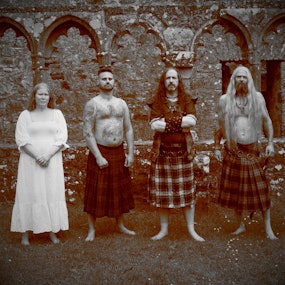
Cruachan
Cruachan are an Irish folk metal band from Dublin that have been active since the 1990s. They have been acclaimed as having "gone the greatest lengths of anyone in their attempts to expand" the genre of folk metal. They are recognised as one of the founders of the folk metal genre. With a specific focus on Celtic music and the use of Celtic mythology in their lyrics, Cruachan's style of folk metal is called Celtic metal.
Keith Fay had formed a Tolkien-inspired black metal band named after the city of Minas Tirith in 1991. Around the same time, he began listening to more folk music and picked up Skyclad debut album The Wayward Sons of Mother Earth. Originally released in 1990, this "ambitious" and "groundbreaking" album made an impact on Fay and he set out to combine black metal with the folk music of Ireland. In 1992, Keith Fay formed Cruachan with a demo recording distributed in 1993. Keith Fay also credits the Irish rock band Horslips as a "huge influence on Cruachan," further noting that "what they were doing in the 70's is the equivalent of what we do now."
The year 1995 saw the release of Cruachan's debut album Tuatha na Gael, an album that "suffered under poor production." On the strength of this album, the band received attention from Century Media Records. The band found it amazing to receive interest from "such a big label" but were dismayed at the terms and conditions of the offered recording deal. They refused to sign a "very poor contract" that woul… Read More
Featured Episodes
Here are some great episodes to get started with


















